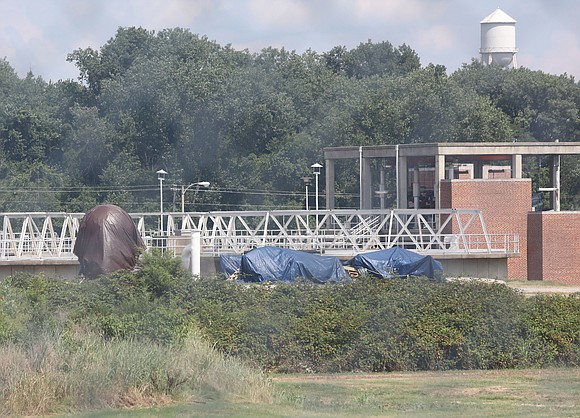City Council still undecided on Confederate statues
Jeremy M. Lazarus | 4/8/2021, 6 p.m.
Twenty-two organizations and individuals have submitted bids to own and relocate one or more of the city’s now stored Confederate statues.
But the bidders – ranging from museums to individuals – will have to wait a little longer. The city is still not ready to choose a new owner—or owners—of the Confederate iconography that was removed from city streets and parks more than nine months ago.
Richmond City Council spent time Monday discussing the next step in the process for disposing of the statues, cannon replicas and other items that were either pulled down last year by demonstrators or taken down by a crew hired by the city.
However, no conclusion appeared to be reached.
The council seemed poised to hand the selection work over to Mayor Levar M. Stoney’s administration, but then pulled back from that stance during an Organizational Development Committee meeting. At this point, a council consensus on the direction could await another meeting.
Other items related to the monuments also remain undecided. For example, no final report and conclusion have been announced in a special prosecutor’s probe into Mayor Stoney’s use of city funds to remove most of the statues in early July.
The mayor also has not yet announced any movement on the removal of the statue of Confederate Gen. A.P. Hill in North Side. A statue of the general, along with his entombed and his remains, are at Hermitage and Laburnum avenues.
Also still in limbo is the legal action to remove the state-owned statue of Confederate Gen. Robert E. Lee that dominates Monument Avenue. The Virginia Supreme Court has not set a hearing date for an appeal from nearby landowners seeking to prevent Gov. Ralph S. Northam from removing the towering figure on horseback.
Still, the city’s authority to remove the statues it owns received a boost from a decision that the state’s highest court handed down April 1.
In a case involving Charlottesville, the state Supreme Court found that a 1997 law the General Assembly passed to protect Confederate monuments located in cities applied only to those statues erected after the law went into effect.
The seven-member court overturned a lower court ruling that sought to apply the law to statues that were put in place long before 1997. A law protecting statues located in counties was passed in the early 1900s, but that law did not cover statues in cities.
The state Supreme Court unanimously found that under long-standing precedent, laws apply going forward unless the legislature includes language specifically stating that a law also applies to past actions. In this case, the General Assembly did not include such wording.
The ruling came on an appeal from Charlottesville seeking to overturn a lower court’s injunction barring that city from covering or removing two Confederate statues located in city-owned parks. Those parks had been named for Confederates, but have since been renamed.
The high court ruled that Charlottesville could do what it wanted with the statues because they were installed decades before 1997.
The ruling also appears to apply to any of the Confederate statues the City of Richmond owns and removed as those also were put in place long before the 1997 law.
However, the ruling did not address statues whose deeds of gift to a community were accompanied by a covenant requiring a community to maintain them forever, a key issue in the case of the Lee statue.






